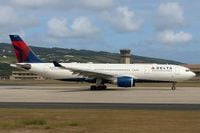On July 6, 2025, a routine transatlantic flight turned into a tense emergency for passengers aboard Delta Air Lines Flight 127. The Airbus A330-300, registered as N805NW, was en route from Madrid-Barajas Airport to New York's John F. Kennedy International Airport when its right-hand engine suddenly failed mid-flight over the Atlantic Ocean. What followed was a swift and skillful response that ultimately ensured the safety of all 295 people on board.
Passengers reported hearing an alarming "whizzing" noise, soon followed by the sharp smell of something burning inside the cabin. Recognizing the severity of the situation, the flight crew declared a Mayday call, signaling an urgent emergency. The pilots promptly shut down the affected engine and initiated a controlled emergency descent, coordinating closely with air traffic controllers to divert the aircraft to the nearest suitable airport.
The chosen destination was Lajes Air Base on Terceira Island in Portugal's Azores archipelago, a strategic mid-Atlantic location known for its long runway and capacity to handle large aircraft emergencies. At approximately 15:30 local time, the A330-300 landed safely on runway 15, operating on a single engine. Emergency vehicles were on standby, but fortunately, no injuries were reported among passengers or crew.
While the landing marked the end of the immediate danger, the ordeal was far from over for those on board. Lajes Air Base, primarily a military facility with limited passenger amenities, offered minimal services and customs facilities. Passengers and crew were confined to the terminal for several hours, facing uncertainty and disruption. The remote island setting added to the challenge, as travelers awaited further instructions amid limited resources.
Delta Air Lines responded swiftly, dispatching a rescue aircraft—a second Airbus A330, registered N822NW—to retrieve the stranded passengers. This replacement plane arrived the following morning, July 7, allowing travelers to resume their journey to New York. After a delayed arrival late Monday evening, the passengers finally reached their destination.
In the meantime, Delta's maintenance technicians began thorough inspections of the grounded aircraft, focusing on its Pratt & Whitney PW4168 engine. The complexity of such repairs, especially in a remote location, underscores the significant operational and financial impact of unscheduled maintenance on wide-body jets. The airline also reached out directly to affected customers, apologizing for the disruption and offering compensation.
This incident occurs amid heightened scrutiny of the aviation industry, which has faced several close calls and crashes since early 2025. By mid-February, there had already been four major incidents, fueling public concern. However, U.S. Transportation Secretary Sean Duffy emphasized in an interview with FOX Business that aviation remains the safest mode of transportation in the country. "You can’t travel anywhere safer than on an airplane," Duffy said. He highlighted ongoing efforts to improve safety, including hiring more air traffic controllers and upgrading air traffic control systems, acknowledging that progress takes time to reverse years of underinvestment.
Sara Nelson, president of the Association of Flight Attendants-CWA, echoed concerns about the need to modernize Federal Aviation Administration systems to maintain public confidence in air travel. The Delta Flight 127 emergency highlights both the risks and resilience inherent in modern aviation.
Historically, Lajes Air Base has played a crucial role as a lifeline for transatlantic flights facing emergencies. Its long runway and dual civilian-military status make it a preferred diversion point for aircraft encountering mechanical failures, medical emergencies, or severe weather. Despite its limited commercial amenities, Lajes provides vital navigation and emergency support systems under Portuguese and U.S. defense agreements.
The Airbus A330-300 involved in the incident is certified under ETOPS (Extended-range Twin-engine Operational Performance Standards), designed to safely operate long distances on one engine. While engine failures remain rare, they represent high-stakes emergencies that test airline preparedness and pilot skill. The successful handling of Flight 127's engine failure underscores the effectiveness of these safety protocols.
For passengers, such emergencies are understandably unsettling. The experience of sudden engine failure mid-ocean, followed by diversion to a remote island with limited facilities, challenges traveler patience and resilience. Yet, the professionalism of the flight crew, the rapid response by Delta, and the availability of airports like Lajes collectively ensure that safety remains paramount.
As transatlantic travel surges during the peak summer season, airlines face mounting pressures from capacity constraints, pilot shortages, and increased passenger volumes. Incidents like Flight 127's emergency remind the industry of the delicate balance between operational demands and safety imperatives.
Delta’s prompt rescue operation and transparent communication have likely strengthened traveler confidence in the airline’s safety culture. Aviation experts note that while mechanical failures attract headlines, the manner in which airlines manage emergencies often enhances their reputations over time.
Ultimately, the Delta Flight 127 emergency serves as a testament to the robustness of modern aviation safety systems. Thanks to skilled pilots, effective emergency protocols, and strategic infrastructure like Lajes Air Base, all passengers and crew landed safely despite the daunting circumstances. It’s a reminder that even when things go wrong thousands of feet above the ocean, the industry’s commitment to safety and resilience remains unshaken.




